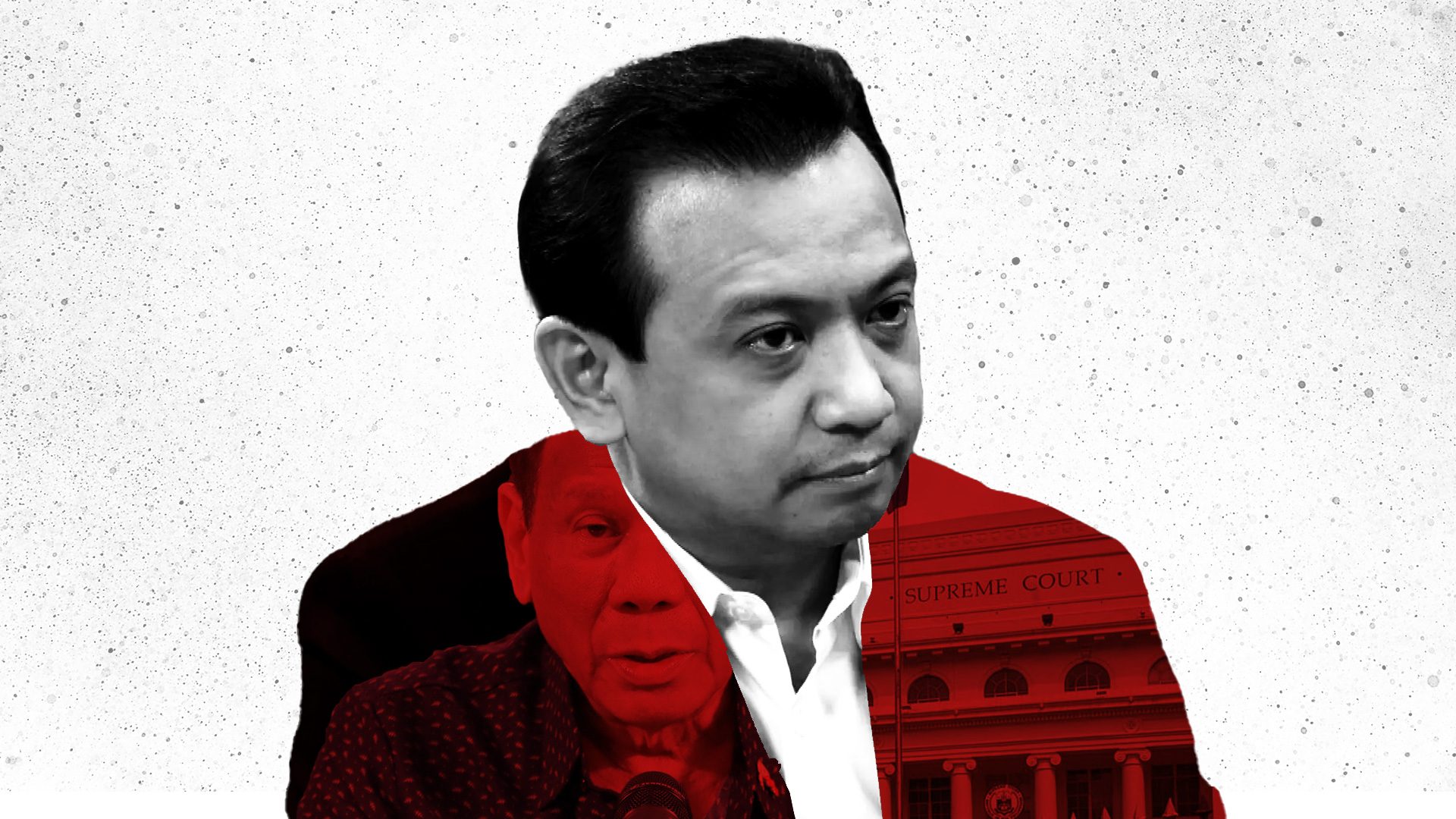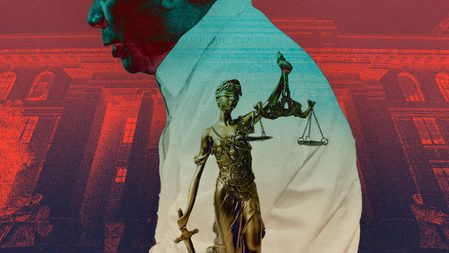SUMMARY
This is AI generated summarization, which may have errors. For context, always refer to the full article.

Two years after his archenemy stepped down, former senator Antonio Trillanes IV secured his first major win at the Supreme Court (SC). It also marked the first time that the High Court directly rebuked former president Rodrigo Duterte by upholding on April 3 the amnesty granted to Trillanes.
It was Duterte who signed Proclamation No. 572 that ordered the revocation of Trillanes’ amnesty.
Speaking to Rappler in an interview, Trillanes said that “in a way,” he expected a positive ruling from the High Court because the issues raised in his case were easy to resolve. But although he was confident, the former senator said he was sure that his SC victory would not come under a Duterte presidency.
“Duterte really had a stronghold over the different democratic institutions and he was weaponizing these institutions against the critics…And they used that to have a chilling effect [on] our society, which made this Supreme Court ruling very, very significant,” Trillanes told Rappler.
Under a different presidency, Trillanes said democratic institutions are now slowly being rebuilt because there’s no longer pressure from the executive.
In 2010, then-president Benigno “Noynoy” Aquino III granted immunity to those involved in the Oakwood mutiny in 2003 and the Manila Peninsula siege in 2007, which included Trillanes. By issuing a proclamation, a Philippine president can grant amnesty – or forgiveness for a person’s criminal action – and may specify the parameters of the amnesty, including its coverage and effects.
But only two years into his term, in 2018, Duterte revoked Trillanes’ amnesty. This came at the height of his staunch criticisms against the then-sitting president. Duterte rationalized the revocation by saying they could not find Trillanes’ amnesty application form even though there was television footage of him filing it.
Importance of the ruling
For Trillanes, the Supreme Court ruling is important because it can be used to avoid similar abuses in the future: “But more than this particular case, this is precedent-setting and will be part of the jurisprudence moving forward. It could be a deterrent to avoid abuses from a president.”
The decision penned by Associate Justice Maria Filomena Singh explained the limitations of presidential powers – it stated that a president cannot unilaterally revoke a granted amnesty. The SC also said that “neither the government nor any of its officials, including the President, are above the law.”
“That was not a necessary or essential element in the decision, but they needed to say that. Because they know that this is a clear demonstration of abuse of power by the executive branch, particularly the president and his legal advisers,” Trillanes said.
The ruling is also important because it touched on the basic principles of the Bill of Rights, which ensures that the constitutional rights of people will not be trampled on. Justice Singh said in the ruling that the revocation of Trillanes’ amnesty, after it became final and without prior notice, violated the former lawmaker’s constitutional right to due process.
Since Duterte’s proclamation that ordered the revocation sought to revive cases that had already been dismissed, the order violated Trillanes’ rights against ex post facto laws (or laws retroactively applied) and double jeopardy, according to the SC.
The SC ruling also resolved the main contention in the amnesty case, which was whether or not Trillanes filed his amnesty application. In the decision, the High Court said there was convincing evidence that the former lawmaker did.
When Aquino granted the amnesty to Trillanes and his colleagues, the then-president explained that he granted the amnesty “to promote an atmosphere conducive to the attainment of a just, comprehensive and enduring peace and in line with the government’s peace and reconciliation initiatives.”
Past presidents like Aquino issued amnesty proclamations to enhance the country’s peace process. Most recently, President Ferdinand Marcos Jr. granted amnesty to rebels, followed by an announcement of new peace talks between the Philippine government and the National Democratic Front of the Philippines.
“The [issue on the] revocation of amnesty, it’s significant because we are using amnesty as a tool for peace, right? So we can have proper negotiations with several groups within our state. If you violated the sanctity of amnesty, there would be trust issues from the part of the party that you would negotiate with someday. They will think that amnesty can be easily revoked,” Trillanes told Rappler.

Could have been earlier
In one session, the present composition of High Court magistrates invalidated two of the Duterte administration’s orders.
Aside from siding with Trillanes, the SC also overturned another Duterte-time policy, ruling that persons convicted of heinous crimes are still entitled to Good Conduct Time Allowance (GCTA). The GCTA law allows convicted persons to have their sentences reduced on the basis of good conduct.
For some, the decision on Trillanes case was surprising, considering that majority of the sitting justices are Duterte appointees. Only two of the 15 current justices were appointed by Aquino – Senior Associate Justice Marvic Leonen and Associate Justice Alfredo Benjamin Caguioa – while the rest, including Chief Justice Alexander Gesmundo, are Duterte designees. (READ: IN NUMBERS: Things to know about the Philippine Supreme Court and its justices)
The SC decision was also strong because compared to other tribunals, the High Court explicitly stated that Duterte’s proclamation that revoked the amnesty was unconstitutional.
Although Judge Andres Soriano of Makati City Regional Trial Court Branch 148 contradicted Duterte and junked the DOJ’s request to have Trillanes arrested in 2018, he said that the issuance of the proclamation was well within Duterte’s powers. Judge Soriano ruled then that there was no sufficient basis to say Trillanes did not file his application for amnesty, and said he could not reopen a case that was already done, due to the principle of immutability of a final judgment.
When the case reached the Court of Appeals, the appellate court sided with Trillanes in 2021, but did not invalidate Duterte’s proclamation.
But for some, the recent decision could have had more impact if it was handed down earlier.
Lawyer Mel Sta. Maria, former dean of the Far Eastern University Institute of Law, said that if the decision had been decided when Duterte was still the president, “it would have been more significant, asseverating that a sitting president with all his authority was not above the law, much more the Constitution.”
Still, Sta. Maria said in his thought piece that Trillanes’ win still has benefits for the former senator: “The Supreme Court decision on Trillanes might have arrived late, but it may nevertheless give the former senator a strong legal foundation for what could be the vindication of his violated constitutional rights.”
The future for Trillanes
When asked if he would go after Duterte following his SC victory, Trillanes said: “My lawyers are studying our options. And if we will do something about this, it will not be born out of vindictiveness because that’s not our style. If we will do something, if we will file complaints, that is to teach some people a lesson, so there will be accountability.”
If Trillanes can prove that Duterte violated his rights, he can file civil and criminal complaints against the former president.
Under article 32 of the Civil Code, “any public officer or employee, or any private individual, who directly or indirectly obstructs, defeats, violates or in any manner impedes or impairs any of the following rights and liberties of another person shall be liable to the latter for damages.” Meanwhile, Section 3(e) of Republic Act No. 3019 or Anti-graft and Corrupt Practices Act penalizes a person who will cause “any undue injury to the party, including the government.”
But even if he won against Duterte in the amnesty case, Trillanes still has reservations about the future. With the possible return of another Duterte to presidency – Vice President Sara Duterte – Trillanes said it could be a resumption of another “six-year nightmare.” The younger Duterte was among the top contenders for the presidency, according to a Pulse Asia survey, just trailing behind Senator Raffy Tulfo.
“So it’s going to be a nightmare for the people in the sectors and the organizations who advocate for strong democracies. Because the Dutertes are anti-democracy. They want to be monarchs, they like being kings and queens,” Trillanes said. – Rappler.com
Quotes were translated to English for brevity
Add a comment
How does this make you feel?

![[Just Saying] Diminished impact of SC Trillanes decision and Trillanes’ remedy](https://www.rappler.com/tachyon/2024/04/Diminished-impact-of-SC-Trillanes-decision-and-remedy.jpg?fit=449%2C449)



![[Closer Look] ‘Join Marcos, avert Duterte’ and the danger of expediency](https://www.rappler.com/tachyon/2024/06/TL-trillanes-duterte-expediency-june-29-2024.jpg?resize=257%2C257&crop_strategy=attention)








There are no comments yet. Add your comment to start the conversation.